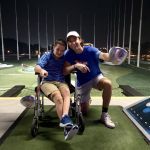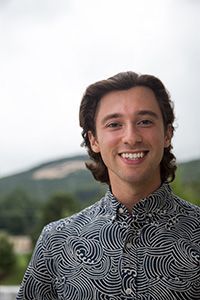What My Brother Taught Me About Disability
February 11, 2019
From the ages of two to five, I had the privilege of praying every single day and night for God to give me a brother. Needless to say, my parents were very content with three children, but that is probably the most consistent and intentional I have ever been with my prayer (which baffles me due to my young age). Yet, it seems that with young age and blissful ignorance comes an unbelievable amount of faith. The same kind of childlike faith that Jesus spoke of in the Bible was the exact childlike faith that I lived out during that time. I couldn’t be more joyous or grateful that my prayer was answered. 
My brother John was born on March 20, 2004, in Enid, Oklahoma. Beginning from birth, there was a battle for his life. To put it lightly, he struggled from the beginning. The first few years of John’s life were more difficult than anybody else I have ever met. He was sickly and frail from birth, was diagnosed with Down Syndrome, he aspirated food and later had to have the food surgically removed, and was later diagnosed with Acute Myeloid Leukemia and had to go through copious amounts of chemotherapy. After all of that, he had to have two surgeries, including one open heart, to repair a hole in his heart. And if all of this wasn’t enough, his hip socket was injured during one of the surgeries and for the first 12 years of his life, he walked with a severe limp. Now it has digressed to the point where he is not even able to walk anymore because of the amount of pain that it brings him.
One could have the idea that John could be the most withdrawn and spiteful person on the planet. Thankfully, that statement could not be farther from the truth. John is the single most loving human being I have ever met. He loves without bounds and is not afraid to show you tangibly what that looks like. John has one of the most admirable views of people that I have ever seen. My deepest fears, fondest memories, and greatest dreams all revolve around this human being. In the public’s eye, he is “disabled” or impaired, but in God’s eyes, he is made perfect and will be made complete in Heaven, and that is a day that I long to see more than life.
Why is it that when we see how much joy people like John have and we notice that they live a normal life in and of themselves, we still tend to view them as solely “impaired” rather than as a human with unique abilities? Far too often we see somebody’s disability before we see any possible abilities in them. I argue that this way of thinking stems from a skewed societal view of “normalcy.” 
We need to challenge and redefine what society views as normal and abnormal. According to the ADA National Network, they define a person with a disability as, “a person who has a physical or mental impairment that substantially limits one or more major life activity.” While maybe the first thing that comes in our heads after reading that definition is something like Autism or Down Syndrome or a person who can’t walk, I want to make the point of how something so common as a vision impairment where a person is required to wear glasses is defined as a disability. Psalm 139:14 says, “I praise You because I am fearfully and wonderfully made; Your works are wonderful, I know that full well.” If we are made wonderfully in the image of God, then that goes for every human, not just the ones that society deems as different.
I was 5 years old when John was born and I was too young to know that he was going through complications. As we grew, the thought never crossed my mind of what life would be like with a “normal” brother. When you grow up and spend so much time with someone in his situation, you never get the chance to view them as different because you are just doing life together. We should always strive to view everybody as a person and not just label them by their disability. Blaine Grimes, author of “Finding Ability in Finding Dory” summarizes it the best when he says, “Look for the ability in disability.” I challenge you to try and keep this in mind in the future when you encounter someone who is disabled or impaired. The key element of this is to be intentional with others regardless of who they are or how they differ from you. This simple gesture can mean the world to somebody and can promote others to be intentional with you.
References
https://www.christandpopculture.com/99917/
https://www.nytimes.com/2013/11/03/education/edlife/disability-studies-a-new-normal.html
https://services.anu.edu.au/human-resources/respect-inclusion/different-types-of-disabilities
https://adata.org/faq/what-definition-disability-under-ada

Written by: Josiah Frisbie
Josiah enjoys writing for the blog because he believes in the power of discussing relevant topics. He wants to be challenged in his writing and research style while still growing and striving for knowledge.